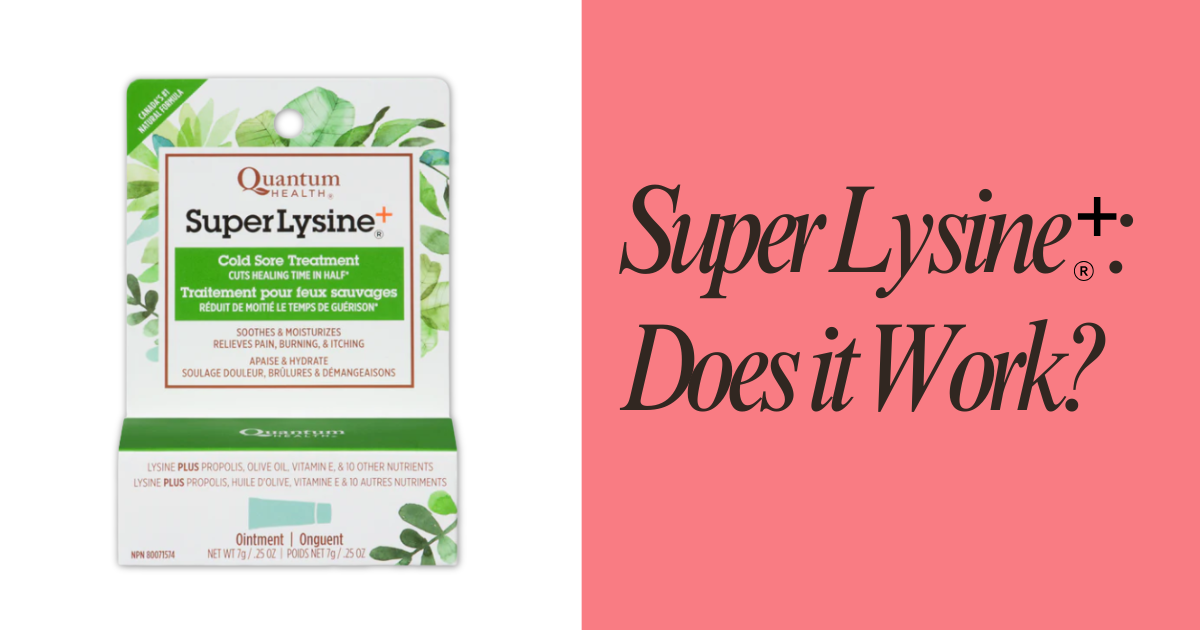
Super Lysine+® has been a popular non-prescription cold sore treatment in the U.S. and Canada for over 20 years, often touted as the “leading herbal cold sore ointment.” While the product claims to reduce healing time by half and promotes the benefits of Lysine, a well-known amino acid that may help suppress the herpes simplex virus (HSV), a closer look at the product’s ingredients and clinical evidence raises some important questions.
Ingredients and Claims
Despite the product’s name, which suggests a focus on Lysine, the only active ingredient identified in Super Lysine+® is Menthol 0.1%, a common pain reliever. While the product’s website emphasizes the role of Lysine in nourishing the skin and potentially suppressing arginine (an amino acid that may support HSV replication), there is no direct mention of Lysine being an active ingredient in the formulation.
The website claims that Super Lysine+® “trims healing time by half,” but this statement is somewhat ambiguous. The duration of cold sore outbreaks can vary significantly from person to person, making it difficult to interpret what “trimming healing time” truly means for individual users.
The 2005 Pilot Study
A 2005 pilot study published in the Alternative Medicine Review examined the effects of Super Lysine+® on cold sores, with a sample size of 30 participants. The study revealed some promising results:
- 23% of participants reported being cured by day 2.
- 40% were cured by day 3.
- 57% by day 4.
- 87% by day 6.
- 100% by day 11.
The study applied the product every 2 hours, and the results were encouraging, especially considering that the treatment began within 24 hours of the outbreak (compared to 12 hours in studies on other treatments like Abreva). The median healing time for Super Lysine+® appeared to fall between 3 and 4 days, compared to Abreva’s median healing time of 4.1 days.
However, it’s important to note that the study defined “cure” as the complete disappearance of the lesion, not just the crusting over of the cold sore. This is different from Abreva’s definition of “complete healing,” which allows for residual skin changes like redness or flaking.
Study Limitations
While the results of this study seem promising, the study’s small sample size and preliminary nature caution against drawing definitive conclusions. The study itself concludes that due to the limited sample, a larger, randomized, controlled clinical trial is necessary to confirm the efficacy of Super Lysine+®.
Interestingly, the Super Lysine+® website does not link to this study, and the study’s abstract begins with a statement that could be interpreted as a medical claim: “L-lysine, an essential amino acid, inhibits normal replication of Herpes simplex virus (HSV), shortening the normal course and duration of the disease.” Such statements, when associated with a botanical product, could be seen as inappropriate medical claims.
While Super Lysine+® may offer some benefit in sore healing time, particularly when applied early in an outbreak, the lack of definitive clinical evidence and its reliance on Menthol as the active ingredient suggests users should approach it with cautious optimism. For those seeking faster relief, newer treatments like Tranexamic acid have shown promising results. Tranexamic acid has demonstrated effectiveness in providing rapid cold sore care, potentially offering more noticeable and quicker relief. While Super Lysine+® may offer some benefit, further research is needed to fully assess its effectiveness.
Reference(s)
https://altmedrev.com/wp-content/uploads/2019/02/v10-2-123.pdf
